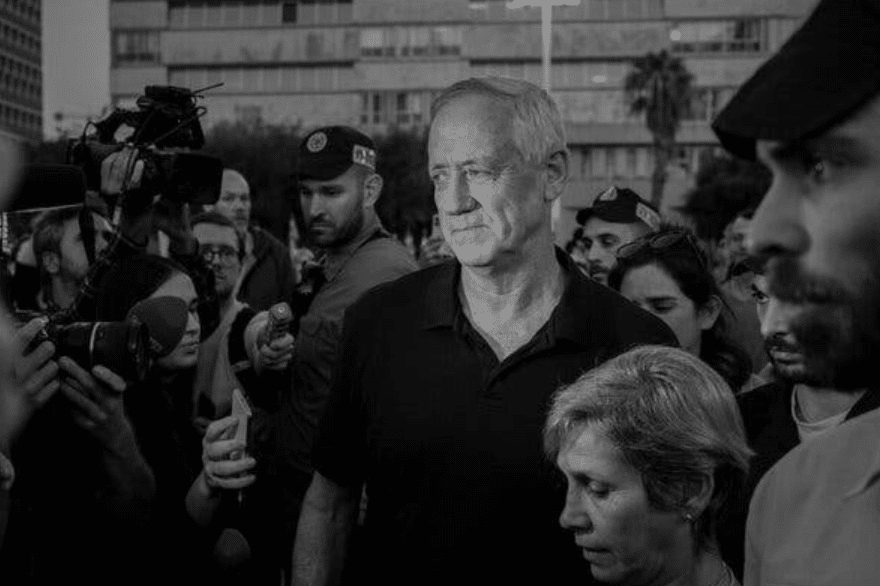Mr. Pfeffer is a senior correspondent for Haaretz and the author of “Bibi: The Turbulent Life and Times of Benjamin Netanyahu.”
Sign up for the Israel-Hamas War Briefing. The latest news about the conflict.
Just over 100 days ago, Benny Gantz was the leader of a small Israeli opposition party. Now, in a shared office inside a nondescript building within the Defense Ministry compound in Tel Aviv, Mr. Gantz is helping lead Israel’s war against Hamas in Gaza as a member of the war cabinet formed by Prime Minister Benjamin Netanyahu.
Mr. Gantz spends his days poring over operational plans, not just of the ongoing campaign in Gaza but also of contingencies for a war that may erupt with Hezbollah, the Iranian-backed Lebanese Shiite organization, on Israel’s northern border.
But the most complex challenge facing Mr. Gantz sits with him at the war cabinet table: Mr. Netanyahu. He has accused the prime minister numerous times in the past of dividing Israeli society. And since the war began, Mr. Gantz’s opinion of Mr. Netanyahu — and his estimation of the damage he is causing Israel — has sunk even lower, according to Gantz aides and political allies interviewed for this piece. Several security officials and foreign diplomats were also interviewed about Mr. Gantz.
Mr. Gantz, 64, is in a unique and contradictory position. He is now, essentially, the grown-up in the room of the Israeli government. Many if not most Israelis, as well as Israel’s allies, look to him to prevent the radical moves being urged by the government’s far-right members. At the same time, according to polls, he is also the man most likely to replace Mr. Netanyahu and his disastrous government. To manage that transition and set the stage for a potential successful premiership will require political deftness, ruthlessness and, above all, an acute sense of timing.
[The New York Times Op-Ed continues]
Soldiers under his command describe him as brave under fire but deliberate in his decision-making off the battlefield, favoring consensus. He even acquired the nickname Benihuta, a play on his name and an Aramaic-Hebrew word for “laid-back.”
To his superiors, he was the epitome of a paratrooper: respectful of authority, commanding through example without raising his voice. He was fast-tracked through a series of command postings. At 42, he was promoted to major general, and a year later, in 2002, put in charge of the Israel Defense Forces’ Northern Command.
But after that his career appeared to falter, with two dead-end postings. He seemed to lack the burning ambition and political acumen needed to reach the very top of the greasy pole.
He made it there anyway.
A dispute in 2009 between Defense Minister Ehud Barak and the I.D.F. chief of staff Gabi Ashkenazi over who should become I.D.F. deputy chief of staff resulted in a compromise candidate: Mr. Gantz. It was supposed to be his last posting, and he retired in November 2010. But a series of scandals tainted the leading candidates for the top job, and he was called back to serve as chief of staff. Once again, and not for the last time, it was Mr. Gantz’s even temperament that got him the job.
Though many of the men who preceded him as commander of the armed forces ran for office after stepping away from the military, Mr. Gantz’s future in politics when his four-year term in that role ended was far from certain. Many thought he didn’t have the mettle. Though he apparently had reservations regarding Mr. Netanyahu and Mr. Barak’s plans for attacking Iran’s nuclear installations, as a cabinet minister has confirmed to me, as I.D.F. chief of staff, his professional disagreements with his political masters remained hidden from the public.
As the 2019 election neared, the absence of a candidate on the center-left capable of challenging Mr. Netanyahu led a group of political operatives to strongly encourage Mr. Gantz to run. As the former I.D.F. chief of staff, he was already widely respected by the Israeli mainstream.
[The New York Times Op-Ed continues]
In polls since Oct. 7, National Unity has surpassed Likud in popularity. When polled about his suitability for prime minister, Mr. Gantz outstrips Mr. Netanyahu, at times by over 20 percentage points nationwide.
Mr. Gantz has refused to give interviews since Oct. 7, eschewing even off-record briefings. But his very presence in the innermost decision-making forum has reassured Israelis. Mr. Gantz is said to have stood against the urgings of the generals, including Defense Minister Yoav Gallant, to launch a pre-emptive strike on Hezbollah in Lebanon. He advocated the hostage release agreement with Hamas, which generals initially rejected because it included a temporary truce during which Hamas could relieve its exhausted fighters.
Mr. Gantz has stuck to bland statements in public. His greatest political asset in a polarized society may be remaining a blank canvas upon which Israelis can project their aspirations.
According to conversations with diplomats for this piece, foreign officials reach out to Mr. Gantz to serve as a counterweight to Mr. Netanyahu. In such conversations, according to people close to him, when asked about the two-state solution, he responds that we’re in a new world and that the old phrase no longer applies, preferring instead to say “two separate entities.” It’s an example, his aides say, of Mr. Gantz’s effort to stay aloof from conflict with Mr. Netanyahu.
Mr. Gantz’s way of selling any future concessions to the Palestinians to Israelis is to wrap them in security necessities. During his period as defense minister, he was also a rare senior minister to meet with the Palestinian president, Mahmoud Abbas.
If — or more likely when — Mr. Gantz decides to leave the war cabinet and take his party back into the opposition, it will mean a crossroads for Israel’s future. It could well be the moment that opens the floodgates of protest, which have been largely shut because of the war, and bring hundreds of thousands of Israelis, including many reservists returned from the battlefield, to the streets to demand Mr. Netanyahu’s resignation.
Mr. Gantz knows full well that he is currently the most popular candidate for prime minister. But he is up against a master of political survival who will stop at nothing to hold on to power. How Mr. Gantz charts his next moves in the coming weeks and months will determine not just his own political fate but also that of the country he has served for the last half-century.

